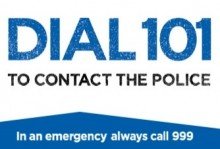Dorset Police is backing a new Home Office campaign to raise awareness of the 101 non-emergency telephone service.
The campaign reminds the public that they should call their local police on 101 for non-emergency issues. Radio and digital advertising will provide examples of non-emergency situations when the public should dial 101, in a bid to raise awareness and understanding of the service.
Dorset Police receives an average of 8,500 calls to the 101 line a week, meaning the non-emergency handlers deal with an average of more than 1,200 calls a day.
Despite improvements to the service in the last 12 months, Dorset Police welcomes the Home Office drive, as the Force still encounters misuse of the service.
Assistant Chief Constable (ACC) David Lewis says: “The range of inappropriate calls to 101 is still surprising. Calls have included requests for an officer to attend to open a caller’s dustbin, as they were concerned there was a cat inside and they were scared to open it. Another caller couldn’t remember the name of their favourite wool shop in Bournemouth but wanted to know if it was open, while complaints range from delayed post to the quality of a jacket potato.
“These calls prevent people who have a genuine police matter to discuss from having their enquiries dealt with in an efficient and timely manner.”
The examples provided by the ACC demonstrate the potential threat to the success the Force has been experiencing.
Dorset Police and Crime Commissioner (PCC), Martyn Underhill, said: “I am pleased by recent performance figures which have seen Dorset Police improve its response times to answering non-emergency calls on its 101 service.
“However, the system is still plagued with people calling about issues that are not for the police to deal with. This inevitably creates delays for those who have enquiries about genuine policing issues- it is vital that people use the 101 service appropriately.”
Using both the non-emergency and emergency numbers appropriately is at the heart of the campaign. It reminds the public of the purpose of the 101 service: to allow enquiries to be logged without detracting from the ability of the police to respond quickly to genuine emergencies.
Nationally, more than three quarters of 999 calls received by the police are for non-emergencies, such as people reporting that their home has been burgled, their vehicle has been stolen, or wanting to discuss anti-social behaviour in their local area.
To help the police tackle crime effectively, the public is being reminded that they should call 101 to speak to the police when there isn’t a crime in progress or risk of violence or to life. The campaign will also encourage the public to remind their family and friends of the service.
Launched in 2012, 101 now covers all police forces across the UK (including Police Scotland and the Police Service of Northern Ireland), and has replaced individual forces’ local numbers.
A call to 101 costs just 15 pence no matter how long your call is. Not only is this cheaper than some forces’ local numbers, the single rate for every call means you know exactly how much your call will cost.
The service is one example of a valuable contact point with the public, an issue in PCC Martyn Underhill’s priorities, he says:
“My Policing Council Tax consultation is running at the moment and I am asking if residents are prepared to pay less than £5 extra per year to improve police accessibility methods, as well as protection of vulnerable people and cyber-crime investigations. Accessibility will include improving 101.”
The PCC’s consultation is available online until Monday 25 January 2016.
The Dorset Police website also has a ‘Do It Online’ contact point service, which allows members of the public to, among other things, make a general enquiry, report lost property or request a call back.
ACC David Lewis encourages people to use this service saying: “The Do It Online service is a quick and free way for members of the public to log their enquiries. We would encourage people to familiarise themselves with this service and, where possible, use it in future should they need to contact the police.
“That said, if you have a genuine police-related concern that you wish to report by telephone please do call 101 and of course, if a crime is in progress, or life is at risk, always call 999.”
Dorset Police, alongside the Home Office, urges the public to educate themselves about the various ways they can contact the Force, including both the emergency and non-emergency numbers, and only use these services when appropriate.
Click here to see what is available in the ‘Do It Online’ service
Click here for more information on when to call 101
Click here to take part in the PCC’s Policing Council Tax Consultation







